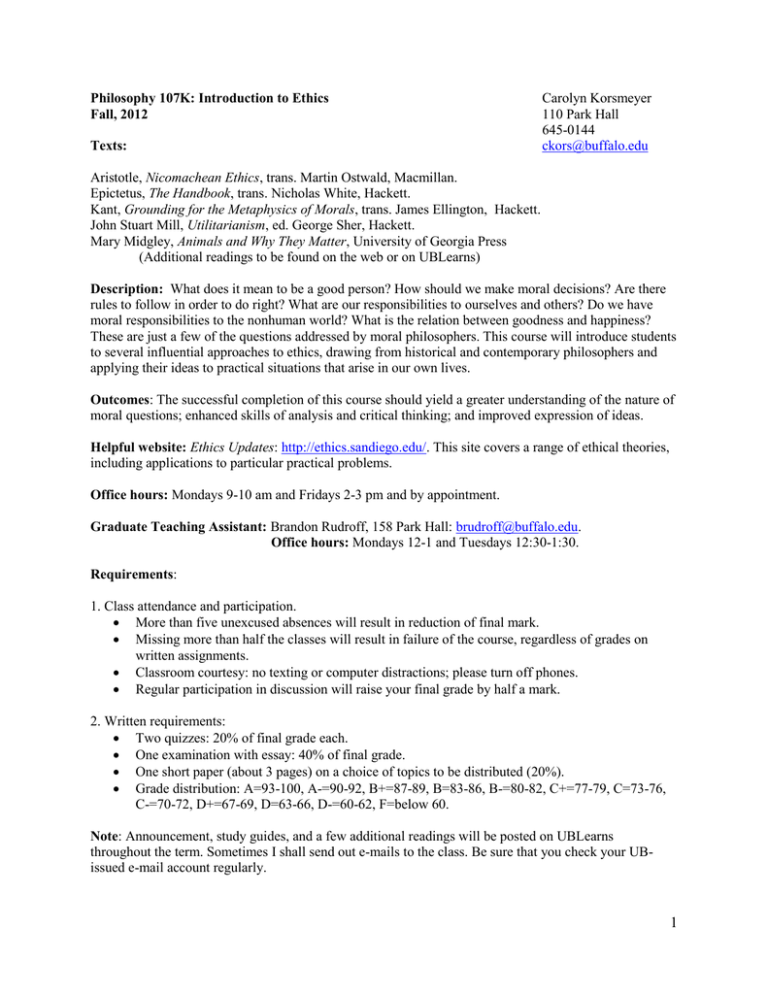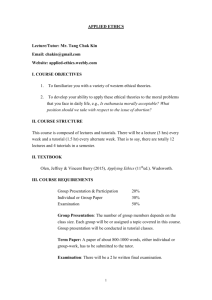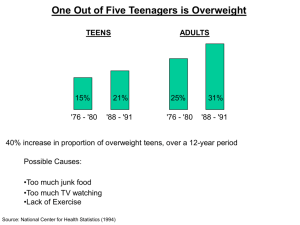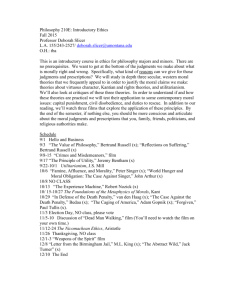Philosophy 107K: Introduction to Ethics Carolyn Korsmeyer Fall
advertisement

Philosophy 107K: Introduction to Ethics Fall, 2012 Texts: Carolyn Korsmeyer 110 Park Hall 645-0144 ckors@buffalo.edu Aristotle, Nicomachean Ethics, trans. Martin Ostwald, Macmillan. Epictetus, The Handbook, trans. Nicholas White, Hackett. Kant, Grounding for the Metaphysics of Morals, trans. James Ellington, Hackett. John Stuart Mill, Utilitarianism, ed. George Sher, Hackett. Mary Midgley, Animals and Why They Matter, University of Georgia Press (Additional readings to be found on the web or on UBLearns) Description: What does it mean to be a good person? How should we make moral decisions? Are there rules to follow in order to do right? What are our responsibilities to ourselves and others? Do we have moral responsibilities to the nonhuman world? What is the relation between goodness and happiness? These are just a few of the questions addressed by moral philosophers. This course will introduce students to several influential approaches to ethics, drawing from historical and contemporary philosophers and applying their ideas to practical situations that arise in our own lives. Outcomes: The successful completion of this course should yield a greater understanding of the nature of moral questions; enhanced skills of analysis and critical thinking; and improved expression of ideas. Helpful website: Ethics Updates: http://ethics.sandiego.edu/. This site covers a range of ethical theories, including applications to particular practical problems. Office hours: Mondays 9-10 am and Fridays 2-3 pm and by appointment. Graduate Teaching Assistant: Brandon Rudroff, 158 Park Hall: brudroff@buffalo.edu. Office hours: Mondays 12-1 and Tuesdays 12:30-1:30. Requirements: 1. Class attendance and participation. More than five unexcused absences will result in reduction of final mark. Missing more than half the classes will result in failure of the course, regardless of grades on written assignments. Classroom courtesy: no texting or computer distractions; please turn off phones. Regular participation in discussion will raise your final grade by half a mark. 2. Written requirements: Two quizzes: 20% of final grade each. One examination with essay: 40% of final grade. One short paper (about 3 pages) on a choice of topics to be distributed (20%). Grade distribution: A=93-100, A-=90-92, B+=87-89, B=83-86, B-=80-82, C+=77-79, C=73-76, C-=70-72, D+=67-69, D=63-66, D-=60-62, F=below 60. Note: Announcement, study guides, and a few additional readings will be posted on UBLearns throughout the term. Sometimes I shall send out e-mails to the class. Be sure that you check your UBissued e-mail account regularly. 1 Schedule of readings and assignments Week of: How should one live? Happiness, Virtue and the Good Life. Aug. 27 Socrates—a profile of a “good life”: Plato, “Apology,” http://classics.mit.edu/Plato/apology.html. Sept. 3 [no classes Monday] What is the good for human life? Aristotle, Nicomachean Ethics, Book I. Sept. 10 What is virtue? Aristotle, Book II. When are we responsible for our actions? Book III, chapters 1-5. Sept. 17 [no classes Monday] Moral weakness, moral strength, virtue, and vice: Book VII> Sept. 24 [no classes Wednesday] The happiest life: Book X. Quiz: Friday, September 28. Oct. 1 Happiness as the control of desire Epictetus, The Handbook. Is There a Moral Law? Oct. 8 Kant, Grounding for the Metaphysics of Morals, Preface and Section I. James Rachels, “The Challenge of Cultural Relativism” (UBLearns) Oct. 15 The Moral Law: Kant, Section I, continued. Onora O’Neill, “A Simplified Account of Kant’s Ethics” (UBLearns) Oct. 22 Applying the moral law: Kant, Section II. Exam: Friday, October 26. (The exam combines a quiz and a short essay on topics to be prepared at home, brought to class, and submitted with the quiz section.) Individual and Social Goods Oct. 29 J.S. Mill, Utilitarianism, Chapters 1 and 2. Ought and Is: Broadcast: Science and Morality Nov. 5. What is justice? Mill, Chapters 3-5. Pojman, “Strengths and Weaknesses of Utilitarianism” (UBLearns) 2 Nov. 12 Utilitarianism, concluded. Ethics and the Treatment of Nonhuman Animals Regan, “The Case for Animal Rights” (UBLearns) Cohen, “The Case for the Use of Animals in Biomedical Research” (UBLearns) Midgley, Animals and Why They Matter, Chapters 1-4. Nov. 19 Midgley, chapter 5 [no classes Wednesday and Friday] Nov. 26 Midgley, Chapters 6-9 Short paper due Friday, November 30. Dec. 3 Midgley, Chapters 10-13. Quiz: Friday December 7. [There is no final exam for this course.] 3







